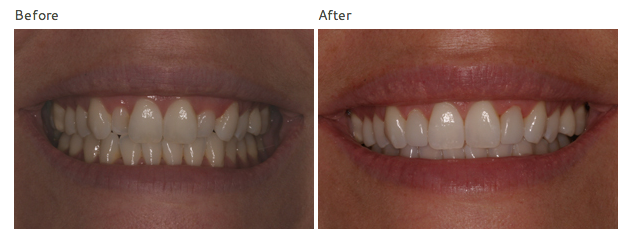What's the Difference between Minimal Prep Veneers & Porcelain Veneers?
May 16th, 2013

At Water Tower Dental care, we accept patients everyday wanting to improve the look of their teeth by the use of veneers. From that, we receive a multitude of questions concerning the difference between porcelain veneers and minimal prep veneers. As we are always happy to answer our patient’s questions, we guide them through the steps it takes to distinguish the two and help them decide which is best for their teeth. We would like to take the opportunity on blog to help more than our patients and explain the biggest difference between minimal prep veneers and porcelain veneers.
What are porcelain veneers?
First, this isn't a chicken or the egg kind of question; porcelain veneers came first, invented by a California dentist named Charles Pincus. When first made, they were only popular with actor's to temporarily change the appearance of their teeth. As time moved forward, better technologies allowed veneers to be placed on patient’s teeth. The biggest advancements were the ability to etch the porcelain to fit a tooth and bond through composite resin that guaranteed a veneer would not come loose.
A porcelain veneer is composed of a thin layer of; you guessed it, porcelain that is placed over a tooth to improve the look and color. In some cases, it helps protect a tooth's surface from damage. While some patients only need one or two teeth covered due to a chip or discoloration, others can request an entire porcelain veneer set, a whole new look to improve their smile.
How veneers are applied
The process is simple, it starts by coming in for a consultation where we take digital photos of the patient’s teeth and alter the image to show them exactly how their porcelain veneers will look. Next, to help a patient feel comfortable with their new smile, the dentist creates a temporary acrylic mold made to mimic the look of the final veneers; we call this a trial smile. Once the patient feels confident that the veneers are exactly how they desire them, we start the process of adding the veneers to the teeth. Porcelain veneers are placed over the teeth like a cap, so to make sure the veneer fits snuggly, the dentist must remove a small amount of tooth enamel. This is a minimal pain procedure but local anesthesia can be administered to relieve the slight discomfort.
Once ready, the veneers are placed over the tooth using lightweight cement that hardens when struck with a special light beam. This allows the dentist to be sure that the veneers are placed, and will set correctly before the cement dries. After the veneers are set, a follow up visit may be required to ensure the veneers have adhered properly. Porcelain veneers can last up to 10 to 30 years, however potential cracking, chipping, discoloration, decay, and shrinkage of the gums may require repairing and maintenance before that time.
So what’s the difference?
The biggest difference between porcelain veneers and minimal prep veneers are not in the look, both are intended to improve a patient's smile by making them whiter with a more uniform look than their original set of teeth. The difference is in the procedure. Water Tower Dental Care offers DURAthin and Lumineer minimal prep veneers, which are paper-thin and designed to fit over your existing tooth structure. This means there is no need to shave tooth enamel down for the veneer to fit. Similar cement is used to align the minimal prep veneer over each tooth and, again, is set with a specialized light beam that dries the cement.
What are the benefits?
The most significant benefit to minimal prep veneers is the ability to keep the natural tooth structure intact. Minimal prep veneers typically require fewer visits to the dentist before applying the veneer. As well, no anesthesia required. In most cases, natural looking, minimal prep veneers can last up to 15 years. They are a great solution to a lasting, beautiful smile, just look at some of these Before and After photos.
Whichever procedure you might choose, it is best advised to come in to Water Tower Dental Care and discuss both options with our qualified team. While not often, some patients are not eligible for certain types of veneers, and it is our job to find the best options for your benefit.






 Website Powered by Sesame 24-7™
Website Powered by Sesame 24-7™